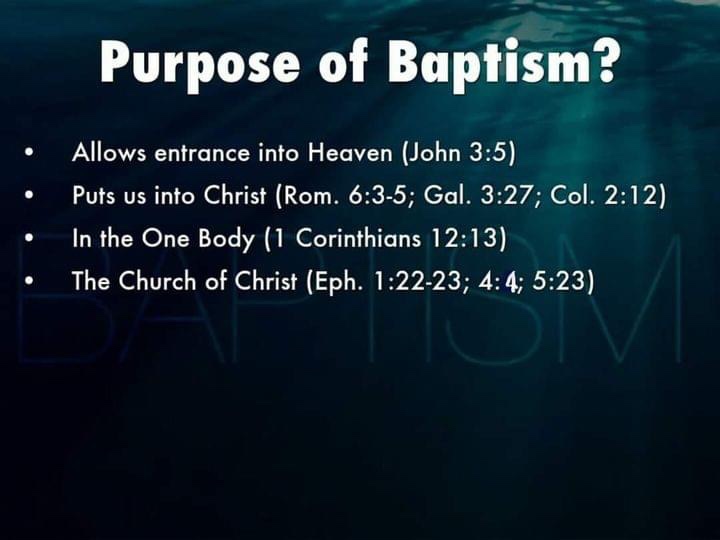Baptism holds a significant place in Christian faith and practice. It’s more than a mere ritual; it’s a profound act of faith and obedience. Let’s explore the key purposes of baptism as outlined in the Bible.

Baptism as a Gateway to Heaven
One of the most profound purposes of baptism is its role in salvation and the promise of eternal life. According to John 3:5, Jesus states, “Except a man be born of water and of the Spirit, he cannot enter into the kingdom of God.” This verse highlights the necessity of baptism as a step towards entering Heaven.
Union with Christ Through Baptism
Baptism symbolizes a believer’s union with Christ. In Romans 6:3-5, Paul explains that through baptism, we are buried with Christ into death and raised to walk in newness of life. Similarly, Galatians 3:27 and Colossians 2:12 speak of being clothed with Christ and buried with Him in baptism, respectively. These passages emphasize that baptism is not just a physical act but a spiritual union with Jesus.

Incorporation into the Body of Christ
1 Corinthians 12:13 explains that by one Spirit, we are all baptized into one body. This signifies that baptism is a rite of initiation into the body of Christ, the church. It’s a communal act that connects us with other believers, transcending cultural, ethnic, and social differences.
Membership in the Church of Christ
Ephesians 1:22-23, 4:4, and 5:23 describe the church as the body of Christ, with Christ himself being the head. Baptism is a step towards becoming a part of this spiritual body. It’s through baptism that believers are added to the church, as seen in Acts 2:41, where those who accepted Peter’s message were baptized and added to the number of the disciples.

Baptism is a multifaceted act with deep spiritual significance. It’s not just a tradition but a vital step in a believer’s journey of faith, symbolizing purification, rebirth, and the commitment to follow Christ. It’s a public declaration of a private decision to follow Jesus, and through it, believers are woven into the rich tapestry of the Christian community.
The Necessity of Baptism for Salvation
The Christian faith emphasizes the importance of baptism not only as a symbolic act but as a crucial step in the journey of salvation. This belief is deeply rooted in the teachings of the Bible.
Baptism as a Commandment from Jesus
In the Great Commission, Jesus commands His disciples in Matthew 28:19-20, saying, “Go therefore and make disciples of all the nations, baptizing them in the name of the Father and of the Son and of the Holy Spirit.” This directive from Christ himself underscores the importance of baptism as an essential part of the Christian faith and the process of making disciples.
Baptism and the Forgiveness of Sins
Acts 2:38 provides a direct link between baptism and the forgiveness of sins. Peter said to them, “Repent, and let every one of you be baptized in the name of Jesus Christ for the remission of sins; and you shall receive the gift of the Holy Spirit.” This passage clearly states that baptism plays a role in the forgiveness of sins, a key aspect of salvation.
Baptism as a Symbol of Death and Resurrection
Romans 6:3-4 explains, “Do you not know that as many of us as were baptized into Christ Jesus were baptized into His death? Therefore we were buried with Him through baptism into death, that just as Christ was raised from the dead by the glory of the Father, even so we also should walk in newness of life.” This passage illustrates baptism as a symbolic act of dying with Christ and being raised to a new life, mirroring the death and resurrection of Jesus, which is central to Christian salvation.
Baptism as a Pledge of a Good Conscience Toward God
1 Peter 3:21 further clarifies the importance of baptism, stating, “There is also an antitype which now saves us—baptism (not the removal of the filth of the flesh, but the answer of a good conscience toward God), through the resurrection of Jesus Christ.” This verse emphasizes that baptism is not merely a physical act but a pledge or commitment made to God from a pure conscience.

Baptism is seen as a must for salvation, not just as a symbolic ritual, but as an act of obedience to Jesus’ commandments, a means for the forgiveness of sins, and a symbolic participation in the death and resurrection of Christ. It represents a transformative journey from the old life of sin to a new life in Christ, making it a cornerstone in the Christian walk of faith.
As an Amazon Associate we earn from qualifying purchases through some links in our articles.



